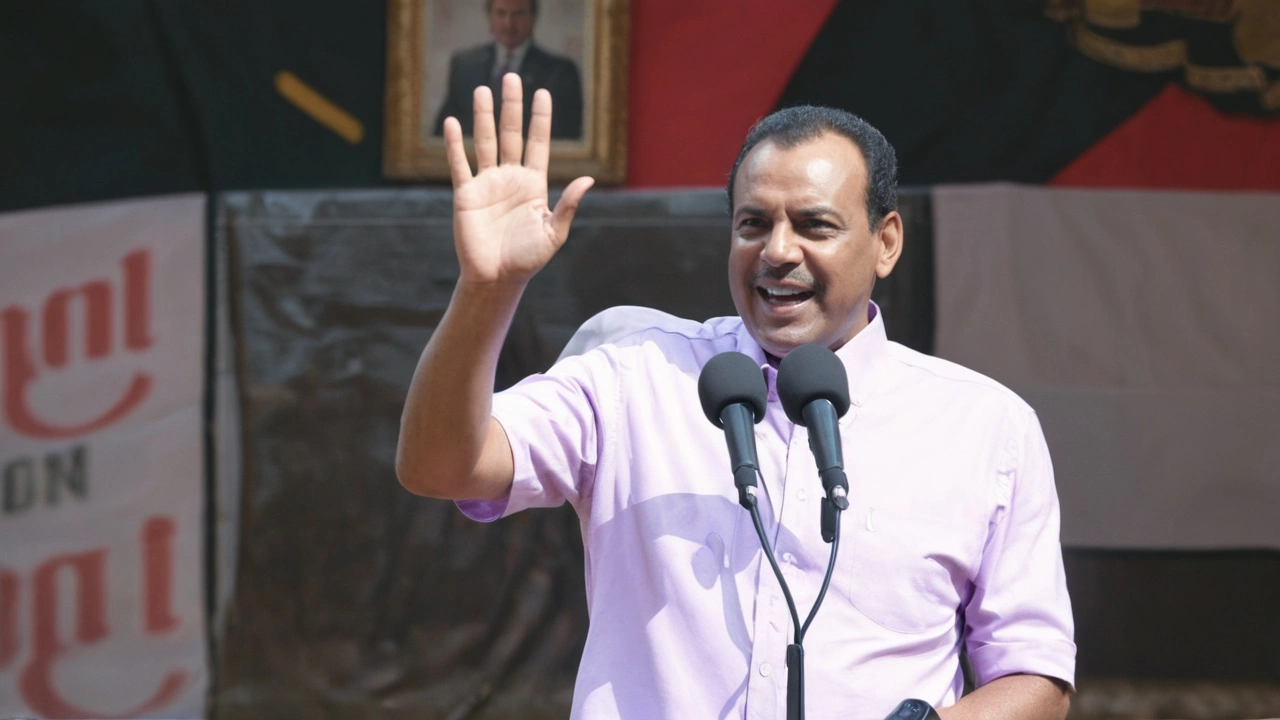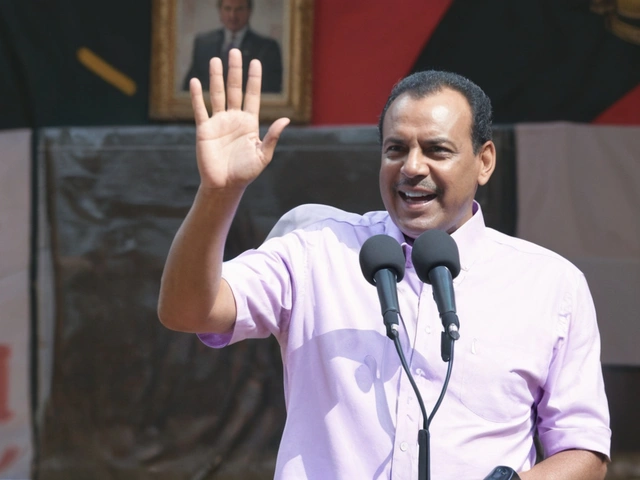Beatrice Askul Moe: A New Era for East African Community Affairs
President Ruto has recently nominated Beatrice Askul Moe as the Cabinet Secretary for East African Community (EAC) Affairs, signaling a substantial commitment to strengthening regional ties. Moe’s nomination arrives at a pivotal moment when the East African region is pursuing deeper economic integration and cooperation to foster sustainable development. Her appointment is part of a broader governmental reshuffle aimed at invigorating Kenya’s regional and international relations.
The EAC, comprising six member states—Kenya, Tanzania, Uganda, Rwanda, Burundi, and South Sudan—has been increasingly focusing on achieving greater economic synergy. At the forefront of this endeavor is the need for competent leadership to navigate the complex dynamics of regional cooperation. Moe's extensive background in public service and regional matters positions her as a suitable candidate for this critical role, but her nomination does not come without challenges.
Vetting of Beatrice Askul Moe
The National Assembly has outlined a detailed vetting schedule, reflecting the rigorous and transparent process that Moe will undergo. This procedure is designed to thoroughly assess her qualifications, experience, and overall suitability for the position. The scrutiny she faces is not merely a formality; it underscores the high stakes involved in managing Kenya's regional engagement policies. The vetting process will encompass an examination of her past roles, her grasp of regional issues, and her vision for the future of the EAC.
Members of the National Assembly and other stakeholders will closely evaluate Moe's track record. Questions about her previous accomplishments, her ability to negotiate and foster cooperation among EAC member states, and her plans to enhance economic integration will be central to the vetting process. Moe’s previous roles have encompassed significant responsibilities, giving her a rich background that, if leveraged effectively, could benefit Kenya's standing and influence within the EAC.
The Strategic Importance of the EAC Portfolio
The East African Community Affairs portfolio is fundamental to Kenya’s foreign policy and regional strategy. Cooperation within the EAC has vast implications for trade, infrastructure development, and socio-economic progress. Effective leadership in this portfolio is essential for ensuring that the collective goals of the member states are met, thereby contributing to a stable and prosperous region. Moe's appointment reflects the administration’s awareness of the importance of robust engagement in the EAC.
Regional cooperation under the EAC umbrella aims to promote trade liberalization, infrastructure development, and common markets, among other objectives. Kenya, being one of the key players in the EAC, has a vested interest in ensuring that these initiatives come to fruition. Therefore, the role of the Cabinet Secretary for EAC Affairs is central to navigating these multifaceted regional aspirations. By pooling resources and efforts, EAC member states hope to achieve significant economic growth and development that individually might be unattainable.
Moe's Vision for the EAC
One of the anticipated aspects of Moe's vetting will be her strategic vision for the EAC. She is expected to outline her plans for enhancing regional cooperation and boosting economic ties. Integrating markets, harmonizing policies, and reducing trade barriers are likely to be part of her agenda. Additionally, Moe will need to address challenges such as political instability in some member states and disparities in economic development levels. Strategic diplomacy and collaborative efforts will be required to navigate these issues effectively.
Moe’s vision is expected to align with the broader objectives of the EAC, including the creation of a single currency and the establishment of a political federation. These goals, though ambitious, are critical milestones for achieving a fully integrated and economically robust region. Her leadership will play a crucial role in advancing these initiatives and fostering a spirit of unity among the member states.
The Broader Impact of Moe's Nomination
Beyond regional considerations, Moe's nomination could have significant implications for Kenya’s international relations. Strengthening the EAC could enhance Kenya’s geopolitical standing, attracting investment and fostering deeper ties with international partners. The EAC is viewed as a gateway to broader African integration initiatives, such as the African Continental Free Trade Area (AfCFTA). Thus, Moe's role will extend to contributing to these larger continental goals.
Success in her new role would not only bolster Kenya's economic prospects but also reinforce its leadership position within East Africa. Given the competitive and dynamic nature of regional and international politics, Moe’s ability to balance national interests with regional commitments will be pivotal. The outcomes of her efforts could serve as a benchmark for other regional organizations across Africa.
Challenges Ahead
However, the path ahead is fraught with challenges. The EAC faces numerous hurdles, including political instability, trade disputes, and infrastructural deficits. Moe will need to leverage her diplomatic skills to navigate these issues while fostering trust and cooperation among member states. Additionally, she must work towards aligning national policies with regional objectives, a task that requires both political acumen and strategic foresight.
Investment in infrastructure, such as transport and energy networks, will be crucial for the EAC’s economic integration. Moe’s ability to advocate for and implement these projects will be a test of her competence. Moreover, addressing social issues such as poverty, unemployment, and health disparities are also integral to achieving sustainable development. Her comprehensive approach will need to balance immediate needs with long-term goals for the EAC.
In conclusion, Beatrice Askul Moe’s nomination as the Cabinet Secretary for East African Community Affairs marks a significant moment in Kenya’s regional engagement strategy. Her successful vetting and subsequent appointment could play a transformative role in the EAC’s journey towards deeper integration and cooperation. As the region looks to enhance economic ties and collective development, Moe’s leadership will be instrumental in navigating the complexities of regional politics and economics.



Comments
While the chorus of congratulations rings loudly, one must ask: is the real objective to cement Kenya's dominance, or merely to parade a token figure? The nomination, dressed in rhetoric, masks the underlying power plays; the EAC agenda, however, demands genuine collaboration, not hollow symbolism! Critics will argue that the timing is perfect for political theatre, but the truth lurks beneath the glossy press releases, waiting to be exposed.
In the grand tapestry of East African ambition, every thread woven by a new leader becomes a verse in an ever‑expanding epic; the rise of Beatrice Askul Moe is no mere footnote, but a dramatic crescendo that ripples through the valleys of Nairobi and the hills of Kigali alike.
She stands at the crossroads of hope and skepticism, a solitary beacon tasked with turning lofty integration dreams into lived reality.
One cannot ignore the weight of history, where past attempts at unity have stumbled over mistrust and divergent visions.
Yet, within each setback lies a lesson, a whispered promise that the next chapter may indeed be different.
Philosophically, the EAC is a living organism, yearning for harmony yet plagued by the chaos of competing interests.
To steer it, one must balance the art of diplomacy with the science of economics, a delicate dance that few can master.
Beatrice's prior service, though not without blemish, offers insights into the intricate ballet of regional politics.
Her challenge will be to foster trust, to mend the frayed cords of cooperation that have long been strained.
Critics will point to the ever‑present specter of political instability, but perhaps the true battle is internal, within the hearts of the member states themselves.
Will they choose solidarity over self‑interest? Only time will reveal the answer.
Imagine a single currency flowing like a river through the continent, unimpeded and powerful; such a vision requires not just policy, but conviction.
In that conviction, there is danger, for ambition unchecked can become arrogance.
Thus, balanced leadership must temper aspiration with pragmatism.
Should Beatrice succeed, the ripple effects could elevate Kenya’s stature, attracting investment, spurring growth, and inspiring other blocs to follow.
Conversely, a misstep could deepen division, casting a shadow over the entire region.
Ultimately, the journey toward integration is less a sprint and more a marathon, demanding stamina, patience, and unwavering resolve.
We, as observers, must hold our breath and hope that this marathon is run with wisdom and courage.
Hey everyone, this is a big step for Kenya and the whole region. If Beatrice can bring people together, trade will flow easier and jobs will grow. Let's stay hopeful and support any moves that help us all succeed.
EAC goals look promising 😊
Beatrice's appointment may seem like a fresh breeze, yet the storms of regional politics never cease; we must look beyond the headlines and ask what true change lies beneath, for words alone cannot heal old wounds.
The facts are clear: Kenya needs a leader who can navigate complex trade agreements, resolve border disputes, and push infrastructure projects forward. Beatrice's background provides some relevant experience, but the real test will be her ability to deliver measurable outcomes rather than just political gestures.
Let's remember that every stakeholder-governments, businesses, and citizens-shares responsibility in this integration journey. By fostering open dialogue and offering mentorship, we can empower emerging leaders to contribute positively, ensuring that the EAC's growth benefits everyone.
We must protect our national interests first-Kenya's growth should not be sacrificed on a vague regional altar! 🇰🇪 Strong borders, strong economy!
While national pride is important, collaboration can also bring mutual benefits without compromising sovereignty.